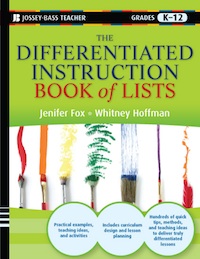Anne Ford- A Special Mother
Anne Ford, former Chair of the National Center for Learning Disabilities, has a great new book out entitled “A Special Mother.” This is a book all teachers should read, to help understand the parents of students who struggle in school, and what they go through on their children’s behalf. Likewise, it’s the book teachers should have ready to suggest to parents who are on the fence or seem in denial about their child’s school struggle, and may help them both acknowledge and accept their child for who they are, as well as help them be good advicates for their kids.
When differentiating instruction, teachers need to try to ensure that all students benefit from lessons, regardless of ability or disability. Depsite all your efforts, there will be some kids with learning disabilities in the classroom who will need additional help. You’re going to need to have the vocabulary and understanding of where the parents of these children are coming from, in order to help them recognize and address their children’s issues.
This is not an easy task. But as a classroom teacher, you are probably the person parents most look to for a clue that their child’s issues are not typical and need “something else.” Without your input, your intuition, your heads up, parents may ignore the issue for years. As a parent, I know we all want our kids to be perfect, and accepting that they’re not, and worse yet, may have a “difference” or “disability”, is really hard to hear. But the educators who first helped me understand and address my own son’s learning probalems will always have a special place in my heart, because they got me to move and address a problem early, before it become more serious and potentially harder to address. It’s not easy to say or to hear that a child is struggling. But hiding the facts under the rug, or hoping it will just go away, only makes a problem worse and harder to solve.
With differentiating instruction, you will be assessing children more frequently, and as a result, you will get a great picture of the student’s strengths and weaknesses. Share this information with parents, including when additional testing may be warranted. It will help parents become better and more effective partners in their children’s education, and will help make your job easier as well. Treat your students and their parents like you would want to be treated, and give them the information they need to make good decisions. They still may not make all the right decisions, and they may still choose to ignore problems, but you will have planted a very important seed towards making that child’s life better in the future.
A Special Mother is a great book to help teachers understand the guilt and self-blame many mothers feel. Once you understand this point of view, dealing with those “crazy, neurotic” parents should become easier as well. That Mom who always seems to shake or cry at teacher meetings may be hearing something she knows but has been afraid to say or acknowledge out loud. That parent who gets angry when their child struggles may be seeing alot of their own struggles in their child, and have a hard time acknowledging not only that there’s something to do for the child, but that no one helped them when they were a kid, and may feel like their own parents let them down.
Children struggling in school can push a lot of buttons for parents, and you may be in the unfortunate position of having to push some of those buttons in order to help your students. I know I’ve struggled how to talk to good friends of mine when I know their child likely has a learning disability, and I know they may not want to hear anything about it. This can be very hard. But it needs to be said and acknowledged.
If children are still struggling even in a differentiated classroom, further evaluation may be warranted. Don’t be afraid to say so, to parents or to the administration. Address the problem as early as possible for the sake of the child. And if you are having problems finding the words or helpng parents deal with the cauldron of emotions, suggest they check out “A Special Mother.” It can only help.





